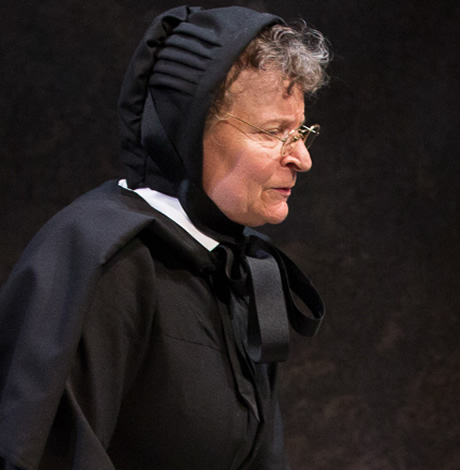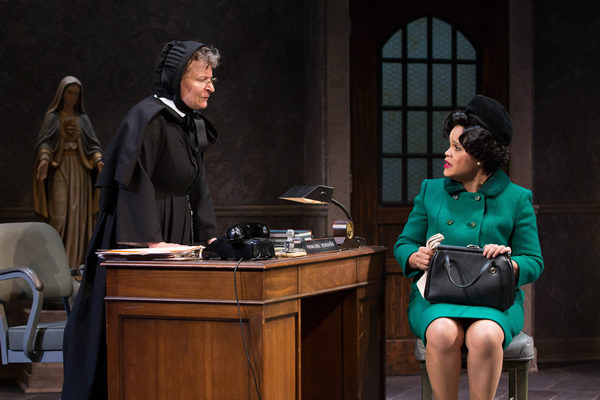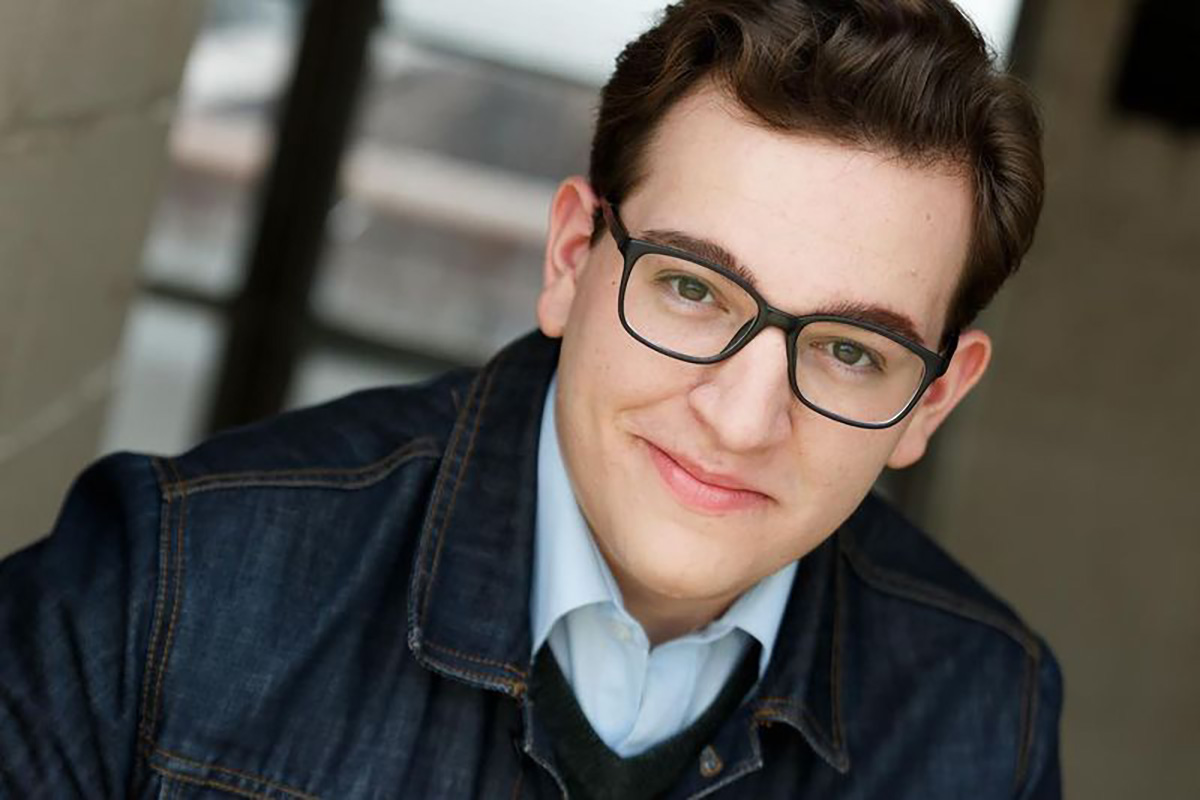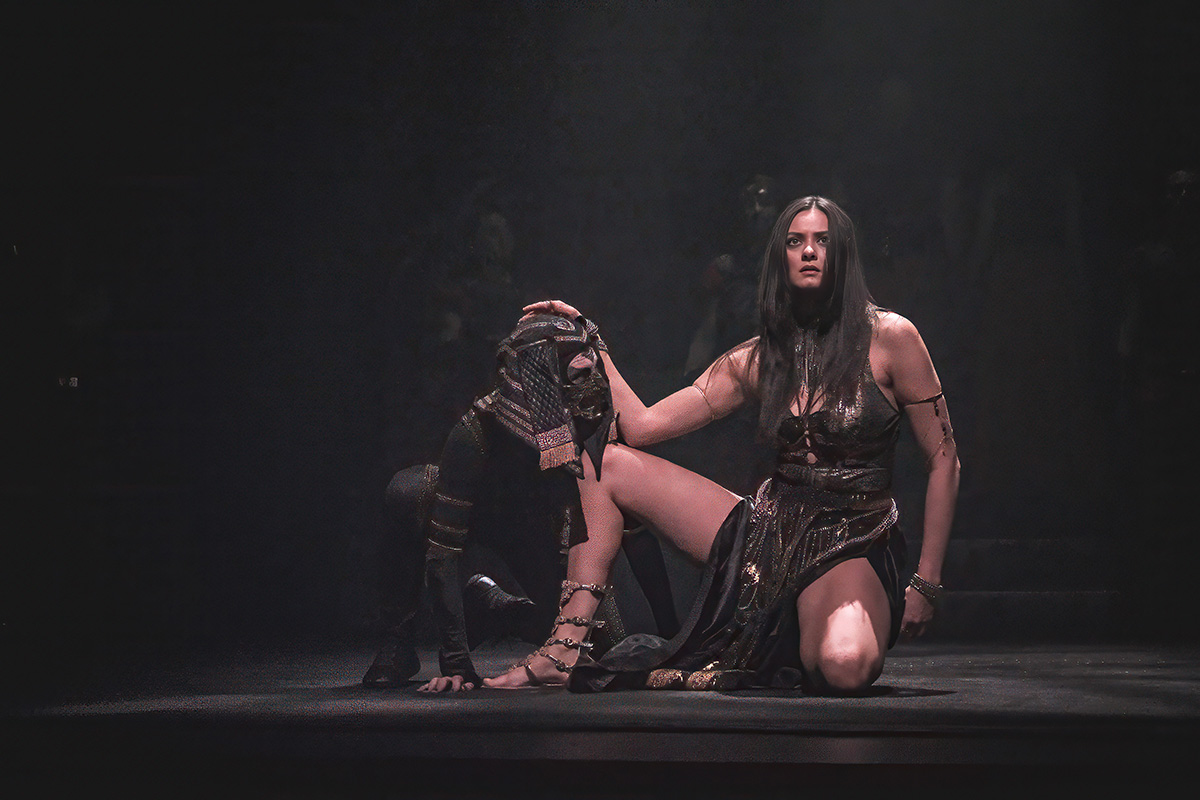Theater
FALL ARTS 2019: THEATER — ‘Cats,’ ‘Cabaret,’ ‘Assassins’ ‘Doubt’ and more
Newly discovered Tennessee Williams one act ‘Lady’ among fall theatrical highlights


First, a few odds and ends:
More of a concert but worth nothing is “Coat of Many Colors: the Music of Dolly Parton,” a tribute event featuring Joan Osborne, Garrett Clayton, Neyla Pekarek, Morgan James, Nova Payton, Jess Eliot Myhre, Rita Castagna and the American Pops Orchestra on Saturday, Sept. 21 at 8 p.m. at Arena Stage (1101 6th St., S.W.). Tickets are $25-75 at arenastage.org.
theatreWashington’s Theatre Week! features discounted tickets on many area shows at $15 and $35 through Sept. 29. Details at theatreweek.org.
The D.C. Queer Theatre Festival continues its reading series of new and unpublished full-length plays on Saturday, Sept. 28 at 7 p.m. at The D.C. Center (2000 14th St., N.W., suite 105). Details at thedccenter.org/queertheatrefest.
Now, on to the regular productions.
Signature Theatre (4200 Campbell Ave., Arlington) continues with its season opener, a terrific production of Stephen Sondheim’s musical “Assassins” (through Sept. 29). Beautifully staged by Signature’s out artistic director Eric Schaeffer, the Tony Award-winning dark comedy tells the story of nine would-be and successful presidential assassins ranging from John Wilkes Booth to Lee Harvey Oswald.
Also, at Signature, out Helen Hayes Award-winning actor Holly Twyford is directing “Escaped Alone” (Sept. 24-Nov. 3). This newish play by brilliant British playwright Caryl Churchill (“Could Nine,” “Top Girls”) centers on three old friends gathered in an English garden “who are joined by a neighbor to engage in amiable chitchat — with a side of apocalyptic horror.” Sounds intriguing. Full details at sigtheatre.org.
Through Oct. 6, “Cabaret” runs at Olney Theater Center (2001 Olney-Sandy Springs Road, Olney, Md.). Based on out writer Christopher Isherwood’s literary classic “Berlin Stories,” John Kander & Fred Ebb’s stunning musical records the rise of fascism in Weimar Berlin through the lens of life in a seedy cabaret. Alexandra Silber stars as striving cabaret singer Sally Bowles and Mason Alexander Park is the Kit Kat Klub’s genderfluid Emcee. Helen Hayes Award-winning out director Alan Paul directs. Full details at olneytheatre.org.
Then at Olney it’s Marco Ramirez’s “The Royale,” a co-production with 1st Stage in Tyson’s Corner (Sept. 25-Oct. 27). Inspired by the true story of African-American boxer Jack Johnson, this look into the mind of an early 20th century boxer is directed/choreographed by Paige Hernandez and features out actor Jaysen Wright.
Woolly Mammoth Theatre Company (641 D St., N.W.) has begun its season with “Fairview,” through Oct. 6. Penned by Jackie Sibblies Drury and directed by Stevie Walker-Webb, this hard-hitting and inventively imagined and staged drama about family and race features a strong cast including Shannon Dorsey, Cody Nickell and Kimberly Gilbert. “Fairview” is the winner of the 2019 Pulitzer Prize for Drama. Full details at woollymammoth.net.
Studio Theatre (1501 14th St., N.W.) enters fall with playwright John Patrick Shanley’s “Doubt: A Parable,” through Oct. 6. The Pulitzer Prize-winning play concerns the suspicions of Bronx Catholic school principal Sister Aloysius (out actor Sarah Marshall) surrounding a young priest’s keen interest in a little boy, the school’s first and only black student. Matt Torney directs. Full details at studiotheatre.org.
GALA Hispanic Theatre (3333 14th St., N.W.) is presenting a commissioned adaptation of Pedro Calderón de la Barca’s classic “La vida es sueño (Life Is a Dream),” through Oct. 13. Adapted by out playwright Nando López, the new take on a timeless work of Spanish Golden Age theater, explores free will, fate and tyranny. The cast of familiar faces features out Spanish actor Mel Rocher. Hugo Medrano directs. Full details at galatheatre.org.
Folger Theatre (201 E. Capitol St., S.E.) has kicked off its season with Shakespeare’s “1 Henry IV” (through Oct. 13). The compelling history play directed by Rosa Joshi, stars Edward Gero as Falstaff and Avery Whitted as Prince Hal.
Then next on Folger’s docket, it’s out Londoner Richard Clifford directing Nick LaMedica as Mozart and Ian Merrill Peakes as Salieri in gay playwright Peter Shaffer’s sensational Tony Award-winning play “Amadeus” (Nov. 5-Dec. 22). Accomplished D.C. scenic designer Tony Cisek is creating the sets for both Folger productions. Full details at folger.edu/folger-theatre.
The Kennedy Center presents “Cats” (Sept. 17-Oct. 6). Based on poems by T.S. Eliot, Andrew Lloyd Webber’s Tony Award-winning mega hit musical tells the story of one magical night when an extraordinary tribe of cats gathers for its annual ball to rejoice and decide which cat will be reborn. If you haven’t yet witnessed a bewhiskered thespian sing “Memory,” resist no more. Now’s the time to see it. Full details at kennedy-center.org.
At Round House Theatre (4545 East-West Highway, Bethesda) Nicole A. Watson is directing Jocelyn Bioh’s hit off-Broadway comedy “School Girls; Or, The African Mean Girls Play” (Sept. 18-Oct. 13). When the new girl arrives in Ghana from America loaded with Western ideas and superior beauty products, she threatens to steal of the crown from her new boarding school’s reigning queen bee. Hilarious battle ensues. The eight person of color cast includes out actor Jade Jones and Temidayo Akibu who recently came out as nonbinary. More details at roundhousetheatre.org.
Taffety Punk (Capitol Hill Arts Workshop, 545 7th St., S.E.) presents “Riot Grrrls: Othello” (Sept. 19-Oct. 12). Directed by Kelsey Mesa, the all-women cast stars terrific actors Danielle A. Drakes, in the title role, and Lise Bruneau as evil Iago. Details at taffetypunk.com.
For fall, Synetic Theater (1800 South Bell Street, Chrystal City) is reprising its 2013 movement-based interpretation of Shakespeare’s “The Tempest” (Sept. 25-Oct. 20). Along with the water-filled stage that made this take on the Bard’s irreverent comedy so memorable, Synetic is keeping it fresh by casting gifted company co-founder Irina Tsikurishvili as “Prospera.” The cast also includes talented out actor Alex Mills as Ariel. Full details at synetictheater.org.
Spooky Action Theater is set to present Tennessee William’s “The Lady from the Village of Falling Flowers” for one performance only (Sept. 21) before it moves on for a short run in Provincetown, Mass. (Sept. 26-29). The newly discovered and never-before-produced one act directed by Natsu Onoda Power mixes Japanese kami-shibai style street theater with storytelling performers in “a punchy send-up of love, the perils of first impressions and our earthly attempts to touch something eternal.” Details at spookyaction.org.
Shakespeare Theatre Company (Lansburgh Theatre, 450 7th St., N.W.) kicks off new artistic director Simon Godwin’s inaugural season with “Everybody” (Oct. 15-Nov. 17). Penned by hot out playwright Branden Jacobs-Jenkins, it’s a takeoff of the 15th-century play “Everyman.” It’s described as “an irreverent, rollicking ride that asks deep questions of all who see it. Remixing the archetypal medieval morality play into an explosive experiment of wit and emotion.” The diverse nine-person cast includes local favorite Nancy Robinette as Death, and nonbinary actor Avi Roque as Somebody. Trans identifying Will Davis directs. Full details at shakespearetheatre.org.
At Theater Alliance (Anacostia Playhouse, 2020 Shannon Pl. S.E.), co-directors Raymond O. Caldwell and Angelisa Gillyard are staging an imaginative retelling of Douglas Turner Ward’s 1965 play, “Day of Absence” (Oct. 5-Nov. 3). Expect a “comedic and pointed commentary on systemic racism that still bears relevance today.” Full details at theateralliance.com.
For fall, Constellation Theatre Company (1835 14th St., N.W.) is doing “Little Shop of Horrors” (Oct. 17-Nov. 17). Set in an obscure Skid Row flower shop, Howard Ashman and Alan Menkin’s zany musical plumbs the mad depths of success, love and bloodthirsty posies with doo-wop and Motownesque sounds. Nick Martin directs. Full details at constellationtheatre.org.
In time for Halloween, Rorschach Theatre presents Qui Nguyen’s “She Kills Monsters” (Oct. 18-Nov. 10). The 2014 inspiring comedy rife with homicidal fairies, nasty ogres and ’90s pop culture, has been re-imagined for 2019, this production will include site-specific elements that bring audiences into unseen places throughout the Atlas Performing Arts Center (Center, 1333 H St., N.E.). Details at rorschachtheatre.com.
The always timely Mosaic Theater Company (Atlas Performing Arts Center, 1333 H St., N.E.) presents “Theory,” playwright Norman Yeung’s techno thriller set against a campus free speech debate (Oct. 23-Nov. 17). Victoria Murray Baatin directs.
Following “Theory” is California-based playwright Jonathan Spector’s “Eureka Day” (Dec. 4-Jan. 5). A mumps breakout at a prestigious day school in liberal Berkeley, Calif., pushes thoughts on facts, consensus and social justice into the spotlight. Mosaic’s talented out managing director and producer Serge Seiden directs a cast of topnotch actors including Regina Aquino, Lise Bruneau, Erica Chamblee, Sam Lunay, and Elan Zafir. Full details at mosaictheater.org.
D.C.’s company dedicated to the LGBT experience, Rainbow Theatre Project (D.C. Arts Center, 2438 18th St., N.W.), kicks off the season with the world premiere of “Blue Camp” (Oct. 31-Nov. 24). Penned by out writers Tim Caggiano and Jack Calvin Hanna and directed by Christopher Janson, it’s described as a Vietnam War story of discrimination in the military, as relevant now as it was then. Details at rainbowtheatreproject.org.
At Theater J (1529 16th St., N.W.), it’s legendary gay playwright Edward Albee’s “Occupant” (Nov. 7-Dec. 8). In this late career work, Albee (“Who’s Afraid of Virginia Woolf?”) probes the life and times of famed sculptor Louise Nevelson. Local actor Susan Rome plays Nevelson and Aaron Posner directs. Details at theaterj.org.
A few other odds and ends: “19: the Musical,” which tells of women who fought for women’s voting rights, runs Nov. 25-27 at the National Museum of Women in the Arts (1250 New York Ave., N.W.). Details at nmwa.org. “My Barking Dog” is Oct. 4-13 at Caos on F Street (923 F St., N.W.). Details at universeplayers2.tix.com. “Paris! the Show” is Tuesday, Oct. 22 at GW Lisner. Tickets are gwutickets.com. And Young Artists of America presents “Once Upon a Mattress” on Sunday, Oct. 27 at 4 p.m. at the Clarice Smith Performing Arts Center in College Park, Md., and Saturday, Nov. 2 at 6 p.m. at the Kennedy Center. Details at youngartistsamerica.org.
Theater
Swing actor Thomas Netter covers five principal parts in ‘Clue’
Unique role in National Theatre production requires lots of memorization

‘Clue: On Stage’
Jan. 27-Feb. 1
The National Theatre
1321 Pennsylvania Ave., N.W.
thenationaldc.com
Out actor Thomas Netter has been touring with “Clue” since it opened in Rochester, New York, in late October, and he’s soon settling into a week-long run at D.C.’s National Theatre.
Adapted by Sandy Rustin from the same-titled 1985 campy cult film, which in turn took its inspiration from the popular board game, “Clue” brings all the murder mystery mayhem to stage.
It’s 1954, the height of the Red Scare, and a half dozen shady characters are summoned to an isolated mansion by a blackmailer named Mr. Boddy where things go awry fairly fast. A fast-moving homage to the drawing room whodunit genre with lots of wordplay, slapstick, and farce, “Clue” gives the comedic actors a lot to do and the audience much to laugh at.
When Netter tells friends that he’s touring in “Clue,” they inevitably ask “Who are you playing and when can we see you in it?” His reply isn’t straightforward.
The New York-based actor explains, “In this production, I’m a swing. I never know who’ll I play or when I’ll go on. Almost at any time I can be called on to play a different part. I cover five roles, almost all of the men in the show.”
Unlike an understudy who typically learns one principal or supporting role and performs in the ensemble nightly, a swing learns any number of parts and waits quietly offstage throughout every performance just in case.
With 80 minutes of uninterrupted quick, clipped talk “Clue” can be tough for a swing. Still, Netter, 28, adds, “I’m loving it, and I’m working with a great cast. There’s no sort of “All About Eve” dynamic going on here.”
WASHINGTON BLADE: Learning multiple tracks has got to be terrifying.
THOMAS NETTER: Well, there certainly was a learning curve for me. I’ve understudied roles in musicals but I’ve never covered five principal parts in a play, and the sheer amount of memorization was daunting.
As soon as I got the script, I started learning lines character by character. I transformed my living room into the mansion’s study and hallway, and got on my feet as much as I could and began to get the parts into my body.
BLADE: During the tour, have you been called on to perform much?
NETTER: Luckily, everyone has been healthy. But I was called on in Pittsburgh where I did Wadsworth, the butler, and the following day did the cop speaking to the character that I was playing the day before.
BLADE: Do you dread getting that call?
NETTER: Can’t say I dread it, but there is that little bit of stage fright involved. Coming in, my goal was to know the tracks. After I’d done my homework and released myself from nervous energy, I could go out and perform and have fun. After all, I love to act.
“Clue” is an opportunity for me to live in the heads of five totally different archetype characters. As an actor that part is very exciting. In this comedy, depending on the part, some nights it’s kill and other nights be killed.
BLADE: Aside from the occasional nerves, would you swing again?
NETTER: Oh yeah, I feel I’m living out the dream of the little gay boy I once was. Traveling around getting a beat on different communities. If there’s a gay bar, I’m stopping by and meeting interesting and cool people.
BLADE: Speaking of that little gay boy, what drew him to theater?
NETTER: Grandma and mom were big movie musical fans, show likes “Singing in the Rain,” “Meet Me in St. Louis.” I have memories of my grandma dancing me around the house to “Shall We Dance?” from the “King and I” She put me in tap class at age four.
BLADE: What are your career highlights to date?
NETTER: Studying the Meisner techniqueat New York’sNeighborhood Playhouse for two years was definitely a highlight. Favorite parts would include the D’Ysquith family [all eight murder victims] in “A Gentleman’s Guide to Love & Murder,” and the monstrous Miss Trunchbull in “Matilda.”
BLADE: And looking forward?
NETTER: I’d really like the chance to play Finch or Frump in Frank Loesser’s musical comedy “How to Succeed in Business Without Really Trying.”
BLADE: In the meantime, you can find Netter backstage at the National waiting to hear those exhilarating words “You’re on!”
Theater
Voiceless ‘Antony & Cleopatra’ a spectacle of operatic proportions
Synetic production pulls audience into grips of doomed lovers’ passion

‘Antony & Cleopatra’
Through Jan. 25
Synetic Theater at
Shakespeare Theatre Company’s Klein Theatre
450 7th St., N.W.
Synetictheater.org
A spectacle of operatic proportions, Synetic Theater’s “Antony & Cleopatra” is performed entirely voiceless. An adaptation of the Bard’s original (a play bursting with wordplay, metaphors, and poetic language), the celebrated company’s production doesn’t flinch before the challenge.
Staged by Paata Tsikurishvili and choreographed by Irina Tsikurishvili, this worthy remount is currently playing at Shakespeare Theatre Company’s Klein Theatre, the same venue where it premiered 10 years ago. Much is changed, including players, but the usual inimitable Synectic energy and ingenuity remain intact.
As audiences file into the Klein, they’re met with a monumental pyramid bathed in mist on a dimly lit stage. As the lights rise, the struggle kicks off: Cleopatra (Irina Kavsadze) and brother Ptolemy (Natan-Maël Gray) are each vying for the crown of Egypt. Alas, he wins and she’s banished from Alexandria along with her ethereal black-clad sidekick Mardian (Stella Bunch); but as history tells us, Cleopatra soon makes a triumphant return rolled in a carpet.
Meanwhile, in the increasingly dangerous Rome, Caesar (memorably played by Tony Amante) is assassinated by a group of senators. Here, his legendary Ides of March murder is rather elegantly achieved by silver masked politicians, leaving the epic storytelling to focus on the titular lovers.
The fabled couple is intense. As the Roman general Antony, Vato Tsikurishvili comes across as equal parts warrior, careerist, and beguiled lover. And despite a dose of earthiness, it’s clear that Kavsadze’s Cleopatra was born to be queen.
Phil Charlwood’s scenic design along with Colin K. Bills’ lighting cleverly morph the huge pyramidic structure into the throne of Egypt, the Roman Senate, and most astonishingly as a battle galley crashing across the seas with Tsikurishvili’s Antony ferociously at the helm.
There are some less subtle suggestions of location and empire building in the form of outsized cardboard puzzle pieces depicting the Mediterranean and a royal throne broken into jagged halves, and the back-and-forth of missives.
Of course, going wordless has its challenges. Kindly, Synectic provides a compact synopsis of the story. I’d recommend coming early and studying that page. With changing locations, lots of who’s who, shifting alliances, numerous war skirmishes, and lack of dialogue, it helps to get a jump on plot and characters.
Erik Teague’s terrific costume design is not only inspired but also helpful. Crimson red, silver, and white say Rome; while all things Egyptian have a more exotic look with lots of gold and diaphanous veils, etc.
When Synetic’s voicelessness works, it’s masterful. Many hands create the magic: There’s the direction, choreography, design, and the outrageously committed, sinewy built players who bring it to life through movement, some acrobatics, and the remarkable sword dancing using (actual sparking sabers) while twirling to original music composed by Konstantine Lortkipanidze.
Amid the tumultuous relationships and frequent battling (fight choreography compliments of Ben Cunis), moments of whimsy and humor aren’t unwelcome. Ptolemy has a few clownish bits as Cleopatra’s lesser sibling. And Antony’s powerful rival Octavian (ageless out actor Philip Fletcher) engages in peppy propaganda featuring a faux Cleopatra (played by Maryam Najafzada) as a less than virtuous queen enthusiastically engaged in an all-out sex romp.
When Antony and Cleopatra reach their respective ends with sword and adder, it comes almost as a relief. They’ve been through so much. And from start to finish, without uttering a word, Kavsadze and Tsikurishvili share a chemistry that pulls the audience into the grips of the doomed lovers’ palpable passion.
Theater
Ford’s ‘First Look’ festival showcases three new productions
A chance to enjoy historical dramas for free before they’re completed

The Ford’s Theatre Legacy Commissions: A First Look – 2026
Jan. 16 & 17
Ford’s Theatre
511 Tenth St., N.W.
FREE
Fords.org
When Ford’s Theatre debuted its new plays festival, “A First Look,” in 2023, it was unclear whether people would come for the staged readings.
“Before the pandemic if you announced the reading of a play, 12 people might show up,” says José Carrasquillo, director of artistic programming at Ford’s Theatre. “Since then, we’ve experienced comparatively massive turnout. Maybe because it’s cheap, or because of the very newness of the works.”
This year’s fourth edition showcases readings of three pieces currently in varied stages of development. The free, two-day festival offers audiences a chance to encounter historical dramas long before they’re completed and fully produced. None are finished, nor have they been read publicly. And befitting the venue’s provenance, the works are steeped in history.
The festival kicks off with “Springs” by playwright Jeanne Sakata and directed by Jessica Kubzansky. Commissioned by The Ford’s Theatre Legacy Commissions, it’s the both epic and personal story of Sakata’s Japanese American family including her grandfather’s experience in an internment camp.
“Sakata’s immigrant grandfather was an exceptionally skilled farmer who helped to stave off starvation in the camp. Still, he never gave up on the idea that he belonged in America. It’s very much a story of today,” says Carrasquillo.
Unlike “Springs,” the festival’s two other works weren’t commissioned by Ford’s. But they both fit the history brief and likely will benefit from the exposure and workshopping.
“Providence Spring,” by California based playwright Richard Helesen and directed by Holly Twyford, portrays Clara Barton (played by local favorite Erin Weaver) as a hero beyond the Red Cross whose then-radical initiatives included cataloguing the Civil War dead, many pulled from mass graves.
Directed by Reginald L. Douglas, “Young John Lewis: Prodigy of Protest” explores a slice from the life of the legendary civil rights activist and longtime congressman. With book and lyrics by Psalmayene 24 and music by Kokayi this collaboratively staged reading between Ford’s and Mosaic Theater is slated to premiere fully produced at Mosaic as a 90-minute musical in the spring of 2026.
“When I was hired at Ford’s in 2018, we began discussing hiring writers who do historical drama,” says Carrasquillo. “Our intention was resolute, but we didn’t do it right away. It took getting through the pandemic to revisit the idea.”
At the same time, the racial reckoning spurred Ford’s to hire playwrights of color to tell stories that had previously been forgotten or ignored.
For Carrasquillo, who is gay, the impulse to commission was crystalized when he saw the film “Hidden Figures,” a true story about “three brilliant African-American women — at NASA during the Space Race, overcoming racial and gender discrimination to make crucial contributions to America’s spaceflight success.” He says, “the film floored me. How many stories like this are there that we don’t know about?”
One of the festival’s happiest experiences, he adds, was the commission of playwright Chess Jakobs’s “The American Five” and its subsequent success. It’s the story of Martin Luther King Jr. and his inner circle, including Bayard Rustin (MLK’s brilliant, unsung gay adviser) leading up to the 1963 March on Washington. The play later premiered fully produced in Ford’s 2025 season.
Increasingly, the readings at Ford’s have become popular with both artists and audiences.
At Ford’s, Carrasquillo wears many hats. In addition to selecting plays and organizing workshops, he serves as an in-house dramaturg for some of the nascent works. But he’s not alone. Also helming the festival are senior artistic advisor Sheldon Epps, and The Ford’s Theatre Legacy Commissions advisor Sydné Mahone.
Because the plays are in development, comments from directors, dramaturgs, and the audience are considered and may become part of the playwrights’ rewrites and changes. If and when the play resurfaces fully produced, audience members might find their suggestion in the completed work.
Is this year’s festival queer influenced? Yes, both by those involved and the topics explored.
Carrasquillo explains, “While Sakata’s “Springs” is primarily about immigration, its message is relevant to the queer community. Civil rights are being taken away from us. We need this playwright’s story to know what has happened and what can happen to any of us.
“Many of Ford’s legacy commissions underscore the importance of civil rights in our country and that’s important to all of us. Queer and not queer.”




















